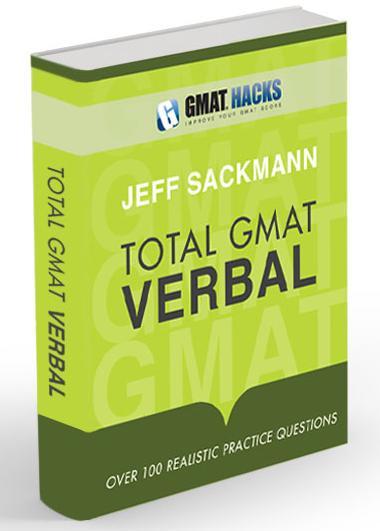
Bookshelf
|
|
Total GMAT Math Jeff's complete Quant guide, on sale now! |
|
|
Total GMAT Verbal Everything you need to ace GMAT Verbal! |
1,800 Practice Math Questions
Buy Jeff's books at Amazon.com

GMAT Official Guide, with IR
OG Math | OG Verbal
OG12 & Quant Rev solutions!
GMAT Question of the Day
Beginner's Guide to the GMAT
GMAT Hacks Affiliate Program

Recent Hacks

Categories
- General Study Tips
- Goals and Planning
- CAT Strategy
- The Mental Game
- GMAT Math Strategy
- GMAT Math Topics
- Mental Math
- Data Sufficiency
- Critical Reasoning
- Reading Comprehension
- Sentence Correction
- Analytical Writing Assessment
- Integrated Reasoning
- IR Explained
- Business School Admissions
- GMAT Prep Resources
- Practice Questions
- Total GMAT Math
- Total GMAT Verbal
- GMAT 111

Commitment, Priorities, and the GMAT
| You should follow me on Twitter. While you're at it, take a moment to subscribe to GMAT Hacks via RSS or Email. |
Every once in a while, I meet with a student who is about to start studying for the GMAT. As we discuss a study plan--often a commitment of six weeks, eight weeks, or more--he or she is visibly excited about the idea, ready to take on the challenge for as long as it takes.
Then, over the first few weeks, I watch that commitment wane. Homework assignments aren't completed, enthusiasm flags, and progress slows. A student can tell just as well as I can that their improvement is slowing or stopped, and that just makes the situation worse.
The GMAT, and Only the GMAT
For the vast majority of test-takers, the GMAT is not easy. Getting the score you want can't be accomplished in a couple weeks of casual study. The only alternative is to work hard, and that will happen most effectively if you sustain the commitment over several weeks, often studying every single day.
If you're working a full-time job, that means you can't do much else. Your social life will be constrained and you probably won't watch very much television.
Just as importantly, you can't multi-task business school applications. If you're studying for the GMAT every two or three days and working on your application essays on other days, you are giving both activities the short shrift.
Prioritize What's Important
If you want a good GMAT score, you'll have to invest the time. You'll have to put off other things. You must study for the GMAT almost daily right up until test day. There's no guarantee of success, but if you don't do those things, you can almost guarantee the opposite.
If you don't know where to start, read up on the GMAT Study Schedule I recommend. Or if you're ready to attack a specific section of the test, purchase a copy of Total GMAT Math or Total GMAT Verbal. Both are structured in exactly the way you should study them--one or two chapters per day is a great way to get yourself ready for the test.
Honestly, it's more important that you have a plan than that you have any specific plan. Stick to the commitment, prioritize what matters to you, and get the best GMAT score you possibly can.
About the author: Jeff Sackmann has written many GMAT preparation books, including the popular Total GMAT Math, Total GMAT Verbal, and GMAT 111. He has also created explanations for problems in The Official Guide, as well as 1,800 practice GMAT math questions.
 |
Total GMAT Verbal
The comprehensive guide to the GMAT Verbal section. Recognize, dissect, and master every question type
you'll face on the test. Everything you need, all in one place, including 100+ realistic practice questions. |